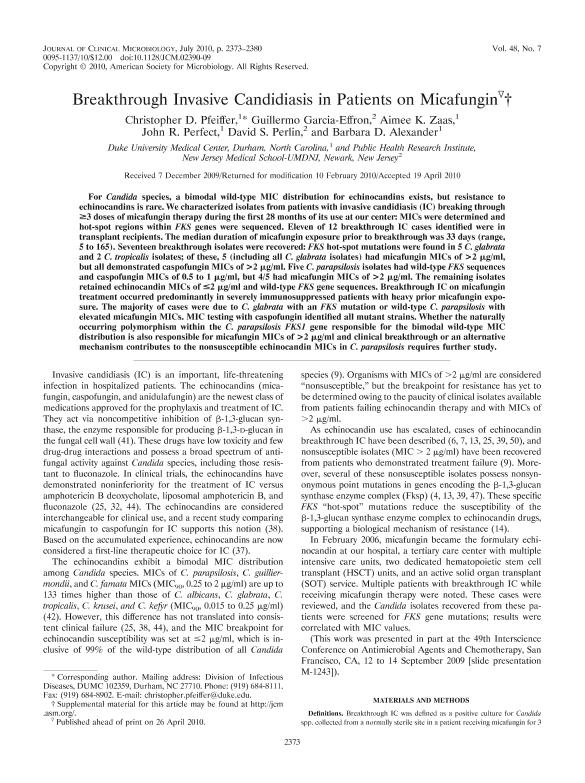Artículo
Breakthrough Invasive Candidiasis in Patients on Micafungin
Pfeiffer, Christopher D.; Garcia, Guillermo Manuel ; Zaas, Aimee K.; Perfect, John R.; Perlin, David S.; Alexander, Barbara D.
; Zaas, Aimee K.; Perfect, John R.; Perlin, David S.; Alexander, Barbara D.
 ; Zaas, Aimee K.; Perfect, John R.; Perlin, David S.; Alexander, Barbara D.
; Zaas, Aimee K.; Perfect, John R.; Perlin, David S.; Alexander, Barbara D.
Fecha de publicación:
07/2010
Editorial:
American Society for Microbiology
Revista:
Journal of Clinical Microbiology
ISSN:
0095-1137
Idioma:
Inglés
Tipo de recurso:
Artículo publicado
Clasificación temática:
Resumen
For Candida species, a bimodal wild-type MIC distribution for echinocandins exists, but resistance to echinocandins is rare. We characterized isolates from patients with invasive candidiasis (IC) breaking through ≥3 doses of micafungin therapy during the first 28 months of its use at our center: MICs were determined and hot-spot regions within FKS genes were sequenced. Eleven of 12 breakthrough IC cases identified were in transplant recipients. The median duration of micafungin exposure prior to breakthrough was 33 days (range, 5 to 165). Seventeen breakthrough isolates were recovered: FKS hot-spot mutations were found in 5 C. glabrata and 2 C. tropicalis isolates; of these, 5 (including all C. glabrata isolates) had micafungin MICs of >2 μg/ml, but all demonstrated caspofungin MICs of >2 μg/ml. Five C. parapsilosis isolates had wild-type FKS sequences and caspofungin MICs of 0.5 to 1 μg/ml, but 4/5 had micafungin MICs of >2 μg/ml. The remaining isolates retained echinocandin MICs of ≤2 μg/ml and wild-type FKS gene sequences. Breakthrough IC on micafungin treatment occurred predominantly in severely immunosuppressed patients with heavy prior micafungin exposure. The majority of cases were due to C. glabrata with an FKS mutation or wild-type C. parapsilosis with elevated micafungin MICs. MIC testing with caspofungin identified all mutant strains. Whether the naturally occurring polymorphism within the C. parapsilosis FKS1 gene responsible for the bimodal wild-type MIC distribution is also responsible for micafungin MICs of >2 μg/ml and clinical breakthrough or an alternative mechanism contributes to the nonsusceptible echinocandin MICs in C. parapsilosis requires further study.
Palabras clave:
Echinocandinas
,
Resistencia
,
Candida
,
micafungina
Archivos asociados
Licencia
Identificadores
Colecciones
Articulos(CCT - SANTA FE)
Articulos de CTRO.CIENTIFICO TECNOL.CONICET - SANTA FE
Articulos de CTRO.CIENTIFICO TECNOL.CONICET - SANTA FE
Citación
Pfeiffer, Christopher D.; Garcia, Guillermo Manuel; Zaas, Aimee K.; Perfect, John R.; Perlin, David S.; et al.; Breakthrough Invasive Candidiasis in Patients on Micafungin; American Society for Microbiology; Journal of Clinical Microbiology; 48; 7; 7-2010; 2373-2380
Compartir
Altmétricas



